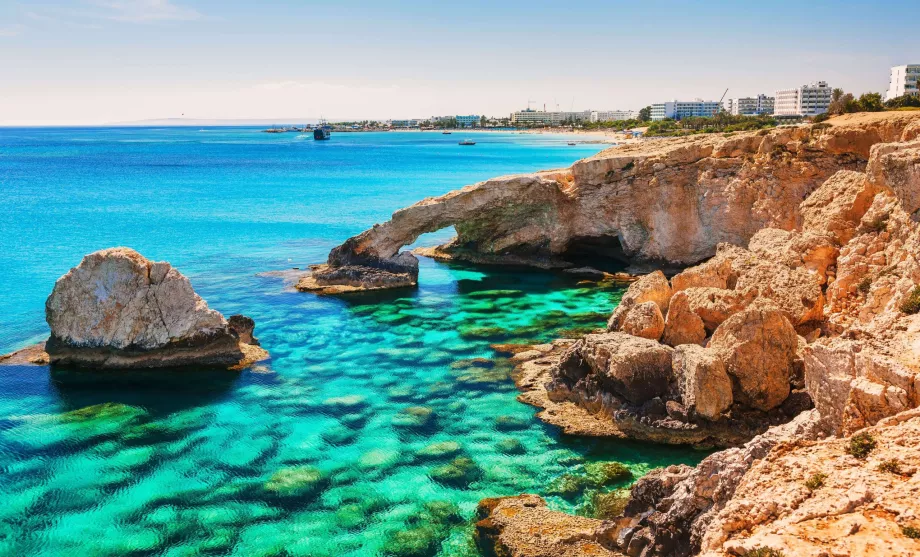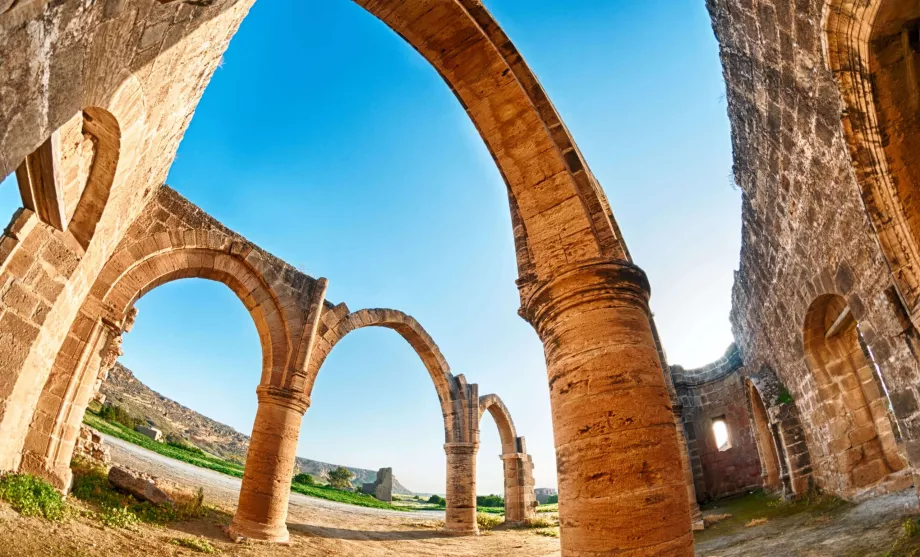Culture and history of Cyprus

How easy is it to speak English in Cyprus? What are Cypriots like and when are shops closed in Cyprus?
Search for accommodation in Cyprus
History in a nutshell
The first traces of human settlement date back to around 8,000 BC, when people began to settle and started to form villages. You can still see the remains of villages today if you visit Salamis or Kourion, for example.
In 1878 Cyprus became part of the British Empire, but since 1955 there have been a series of uprisings and local feuds between Greek Cypriots, Turkish Cypriots and the British. The majority Greek Cypriots demanded reunification with Greece, which at the time was ruled by an authoritarian military junta.
Independence and partition of Cyprus
The UN, however, rejected union with Greece because of fears of a reaction from Turkey, a significant part of whose population also inhabited Cyprus.
In 1960, the British finally surrendered Cyprus and independence was declared as one integral state. Since 1963, however, there has been much, but so far only localised, violence between Turkish and Greek Cypriots.
The year 1974 was a turning point for the future of Cyprus. There was a coup attempt by the military Greek junta to unite Cyprus with Greece. However, the coup was unsuccessful (the military junta in Greece subsequently fell and the country moved towards democracy) and in response the Turkish army launched a massive invasion of the island.
This was unacceptable to Turkey and therefore the invasion was conducted with great force, including the bombing of Cypriot cities. The violent conflict resulted in the displacement of approximately 200 000 Greek Cypriots from the north to the south and approximately 60 000 Turkish Cypriots from the south to the north. Turkish troops controlled the northern minor part of the island (about 36% of the total area of Cyprus).
The violent conflict ended in 1983, when Turkish Cyprus declared an independent Turkish Republic of Northern Cyprus, which, however, is recognized internationally only by Turkey. A UN-controlled buffer zone of between 50 metres and 4 km was drawn up.
Cyprus has been part of the European Union since 2004. The whole island has been admitted to the Union, but European law is suspended in unrecognised Northern Cyprus until the 'Cyprus question' is resolved.
It is currently possible to visit Northern Cyprus via the checkpoint on Ledra Street in the capital Nicosia.
"Southern" Cyprus is a separate republic, although it has much in common with Greece.
Currently, the situation in Cyprus is calm and there is no violence. Tourists are free to visit both parts of the island.
Language
The official language is Greek, which is the mother tongue for most Cypriots and also the official language for communication with the authorities. Greek does not use the Latin alphabet, but a Greek script called Alphabet.
But don't worry, as the vast majority of signs (for example on road signs) are also transcribed into Latin.
You can speak English here almost without any problem, as Cyprus was an English colony until 1960. You can speak to both older and younger people. Most of the signs and markers are in both Greek and English. At least a basic knowledge of English is quite common in even the most backwater mountain villages across generations.
This makes Cyprus unique in the Mediterranean and, apart from Malta where English is the official language, it is by far the best English-speaking country in southern Europe.
Mini-dictionary:
- Good Morning, Good Morning - Kaliméra
- Goodbye - Adio
- Good night - Kalinichta
- Thank you - Efcharisto
- Please - Parakalo
- Yes - No
- No - Ochi
- Which way - Apopu
- Beer - Beer
People and religion
Cypriots are very nice and friendly people, subjectively they are much more relaxed than Greeks, although they consider themselves as one nation. Their nature is very relaxed and they always have plenty of time. They are not in a hurry to go anywhere and are not stressed. They are willing to help and advise you with everything. Don't expect much punctuality from Cypriots, twenty minute delays are no exception.
The majority of the population are Orthodox Christians, and this religion plays an important role and reinforces traditional Cypriot values. You can find a church even in the most remote place on the island.
Cyprus has a population of around 950,000. The majority of the population is Greek Cypriot, but there are also minorities such as Turkish Cypriots, Greeks, English, Romanians and Russians.
Holidays
Cyprus has strong traditions that are passed on to the next generation. Easter is the most important religious holiday. Every Cypriot goes to visit the church where masses are held. If you choose to study in Cyprus, the Easter holidays last 14 days unlike the Czech ones.
In February every year, the world famous carnival is held in the city of Limassol. The festival takes place over a few days and people perform beautiful costumes, sing songs, dance, eat and celebrate life. Christmas Eve is celebrated here on 25 December.
In Cyprus, the following holidays are celebrated, which are also days off:
- 1 January - New Year
- 6 January - Epiphany, the appearance of Jesus Christ according to the Orthodox Church
- 6th Monday before Easter Sunday - Clean Monday (a church holiday)
- 25 March - Greek Independence Day (also celebrated in Cyprus)
- 1 April - National Day of Cyprus (independence struggle)
- Good Friday - floating date (Easter)
- White Saturday - floating date (Easter)
- Easter Sunday - floating date (Easter)
- Easter Monday - floating date (Easter)
- Easter Tuesday - moving date (Easter)
- 1 May - Labour Day
- Whit Monday - first Monday after Pentecost (floating date)
- August 15 - Assumption of the Most Holy Mother of God
- 1 October - Cyprus Independence Day
- 28 October - National Day of Greece
- 24 December - Christmas Eve
- 25 December - First Christmas Day
- 26 December - Second Christmas Day
Tourist services, restaurants and smaller shops remain open over the holidays. Bus services operate according to Sunday timetables during the holidays.
Culture
The people of Cyprus are very friendly and easy-going. Locals are not very punctual and can be half an hour late for appointments. Almost everyone loves coffee and frappé is very popular in the summer. Cypriots can sit and talk for hours over coffee.
Cyprus has much in common with Greece and although it has been an independent state for many decades, Greek flags fly alongside Cypriot flags at every turn (including official government buildings).
Cypriots and Greeks consider themselves one nation, however Cypriots are more friendly and also more orderly than Greeks.
If you talk to locals, keep in mind that the northern part of the island has been under occupation by the Turkish army since 1974. Many Greek Cypriots have been driven from their homes from the north to the south. The issue of the division and reunification of the island can be very sensitive for some, especially the older generation.
Tourism
Tourists generally seek out seaside resorts that are economically viable and of a high standard thanks to the tourists Hotels are of a high standard and there is a huge range of accommodation to choose from. Popular destinations for beach holidays are the towns of Ayia Napa and Protaras. Beaches such as Nissi Beach and Fig Tree Bay are rated as some of the best in Europe.
Cyprus is a popular destination due to its beautiful sandy beaches and the opportunities to try many water sports such as diving and boating. The island also offers plenty of reefs and beaches where you won't meet many people, and if you do find them, you'll have some unique moments. If you love beautiful beaches, warm weather, fabulous food and friendly people, Cyprus should not be missed.
Cyprus is a developed European country with full service facilities.
Any questions left?
If you have any questions or comments about the article...


